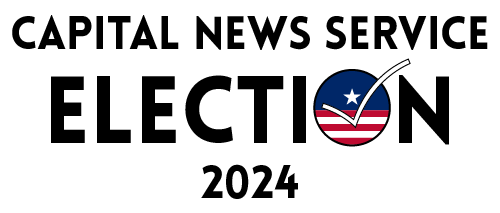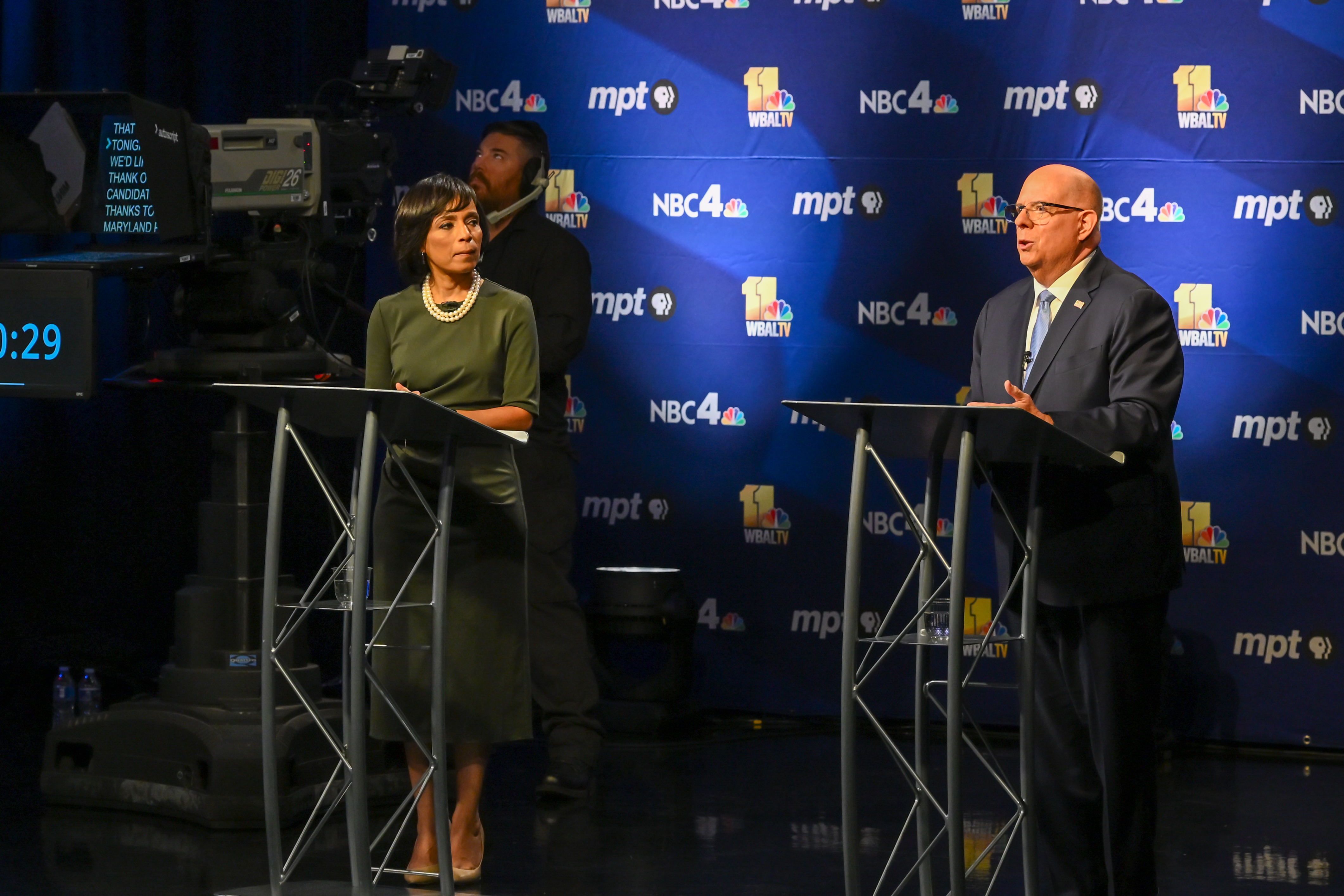WASHINGTON – Despite having “Republican” under his name on Maryland’s ballots, former Gov. Larry Hogan has been running for the U.S. Senate on the notion that he’s more of an independent, someone who can work on either side of the political aisle.
That messaging hasn’t stopped Hogan’s campaign from receiving significant campaign support from Senate Minority Leader Mitch McConnell, R-Kentucky, as well as two Republican senators vying to replace him as the next GOP Senate leader: John Cornyn of Texas and John Thune of South Dakota.
Hogan, who was recruited to run in the election by McConnell, is pitted against Prince George’s County Executive Angela Alsobrooks in what is considered one of the country’s most pivotal contests. The Maryland seat is being vacated by retiring Democratic Sen. Ben Cardin.
 The Hogan campaign declined to respond to questions by phone and email about the contributions.
The Hogan campaign declined to respond to questions by phone and email about the contributions.
Hogan’s campaign has received more than $235,000, including a $75,000 contribution on Sept. 25, from the Cornyn Victory Committee, according to Federal Election Committee reports filed on Tuesday.
Politico reported that Thune’s super PAC, New Heights Action, has given $1 million to PACs to help Hogan’s campaign.
New Heights Action has given $750,000 to Maryland’s Future, a super PAC supporting Hogan, according to the FEC filings.
A McConnell-linked super PAC, Senate Leadership Fund, gave $2 million to Maryland’s Future in July.
Maryland’s Future has been behind a wave of advertising engulfing the state and had $16 million left to spend as of Sept. 30.
At the end of September, Axios reported that WinSenate, a Democratic PAC linked to Chuck Schumer, was launching $1.1 million worth of ads for Alsobrooks over the first two weeks of this month.
With the aid of four independent senators who caucus with them, Democrats hold a two-seat advantage in the Senate. Hogan swinging a seat in Maryland, a deeply Democratic state, would represent a major political coup for the Republicans.
“I think there’s always one race that people aren’t paying attention to that we end up picking up. I think that could be Maryland this time,” Cornyn said in a Sept. 24 conversation with Capital News Service.
Both Cornyn and Thune have flexed their well-established fundraising muscles as they, along with Rick Scott, R-Florida, seek to succeed McConnell, who is relinquishing his leadership post at the end of the year.
On Sept. 24, Cornyn sent out a letter to donors detailing that he has raised more than $400 million since he joined the Senate in 2002.
The Cornyn Victory Committee has raised nearly $16 million in this election cycle, according to Open Secrets. The money has been spread out among a number of candidates, with Hogan being near the middle of the group in terms of total donations from the Texan’s PAC.
The Hill reported last month that Thune announced at a political strategy meeting that he would transfer $4 million from his personal campaign to the National Republican Senatorial Committee in an effort to chip away at the large fundraising advantage held by Democrats. The donation was the largest ever by a Senate Republican, doubling the previous record, set by Thune in 2016.
The Alsobrooks campaign has held a fundraising advantage over Hogan’s campaign in recent months.
Alsobrooks’ principal campaign committee raised more than $13.4 million in the last cycle from July 1 through Sept. 30, significantly more than Hogan, whose campaign committee raised $3.3 million in the same period, according to FEC filings.
Both Hogan and Alsobrooks have joint fundraising arrangements with party fundraising committees that provide their campaigns with additional funds while raising money for their parties.
The Alsobrooks Victory Fund, created by her campaign and the Democratic State Central Committee of Maryland, raised nearly $3.8 million during the reporting period. Similarly, the Hogan Victory Fund, set up between his campaign and the National Republican Senatorial Campaign, raised $5.4 million.
Alsobrooks’ principal campaign committee had almost $3.4 million in cash on hand at the end of last month. Hogan’s principal committee reported nearly $1.6 million in cash on hand.
Hogan is Maryland’s first two-term Republican governor in over 60 years and remains fairly popular.
A University of Maryland Baltimore poll released on Oct. 9 said 53% of likely Maryland voters had a favorable opinion of Hogan, compared to 49% for Alsobrooks.
However, the poll gave Alsobrooks a nine-point lead in a race that was neck-and-neck only a month ago.
Some analysts believe a major reason for Alsobrooks’ advantage could be Hogan’s party allegiance: the former governor is sharing the ticket with former President Donald Trump. Even though Trump endorsed him, Hogan is not returning the favor, saying he will not vote for the GOP standard-bearer.
Hogan’s party ties were a major focus in his Oct. 10 debate with Alsobrooks, with the Prince George’s county executive repeatedly warning of the dangers of a Republican-controlled Senate.
More than 30% of those surveyed in the UMBC poll cited either support for Democratic control of the Senate or reproductive rights as their reason for voting for Alsobrooks.
“We are facing an election where the future of our country and our freedoms are at stake,” Alsobrooks said during the debate. “The Republican Party has declared war on women’s reproductive freedoms, we recognize that this party of chaos and division led by Donald Trump can not lead this country and also has severe consequences for Marylanders.”
Throughout the debate, Hogan characterized himself as someone who could overcome partisan politics.
“I think what we need desperately in Washington are people that are willing, that have the courage to put country over party and to put people over politics, and to stand up to the leaders of their party,” Hogan said. “I don’t think there’s anyone in America who has done that more than me.”


You must be logged in to post a comment.